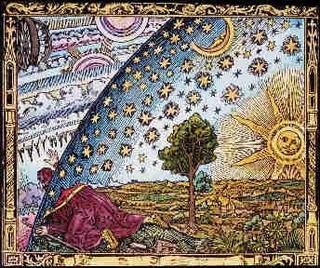
Why is there something rather than nothing?
LucretiusThe skeptic: The universe is eternal. It simply is. There is no need for a creator. Moreover, If the universe has a creator, then it is impersonal, merely a force.
The theist: The universe couldn't have happened by itself. All results from an uncaused Cause, which is eternal, omnipotent, omniscient, purposeful, and personal. Astronomer magazine's Robert Naeye: "On Earth, a long sequence of improbable events transpired in just the right way to bring forth our existence, as if we had won a million-dollar lottery a million times in a row. Contrary to the prevailing belief, maybe we are special."
Stephen Hawking: There may or may not be a creator, but the Big Bang didn't necessarily depend on it. Hawking to a science writer who asked him about any connection between Hindu myth and Black Hole evidence: "It's fashionable rubbish. People go overboard on Eastern mysticism because it's something that they haven't met before. But as a natural description of reality it fails abysmally to produce results."
My comment: In our daily lives we can believe or disbelieve, but we can take away from quiet moments a different understanding of the matter. In that understanding, the questions no longer seem important. The understanding does not imply atheism or theism as the final truth, the ultimate meaning. Rather, it allows us to see things in a new light * by a method that is empirical and verifiable--not some abstract, debatable notion. Part of our discovery is that thoughts beget thoughts, that they are "mechanical" things requiring no thinker to think them. ( Empirical philosopher David Hume said as much in the Eighteenth Century.) In turn, self is created by mind, neurons if you want, and no ego, no little man or woman, presides over the course of our daily affairs. This understanding derives from a state that precedes all our usual questions and doubts. Unlike some scientists' claim, the state is not wrapped in mist, but is one of high, generalized, awareness. When asked what happened to him, Buddha said that he awakened. Buddha made no claims whether all was finite or infinite, godless, or godly. From the vantage of this state, the questions disappear and are seen as more creatures of the mind.
That is the meaning of the leader for this article's title, an old Zen saying by Seng-Ts'an--"The Perfect Way is only difficult for those who pick and choose. Do not like, do not dislike; all will then be clear. A hairbreadth difference, and Heaven and Earth are set apart." Theist and skeptic impose the difference that sunders Heaven and Earth.
* (In Zen, form is emptiness, emptiness form. Each enables the other and is the other.)
Daniel Dennett, along with various other researchers and thinkers, has arrived at this view of no-self without any "mystical" experience. Theirs, however, seems to remain a largely intellectual understanding. Articles on them can be found variously in this blog. As an example of scientific explanations that don't rely on Eastern thought, see Space Capsules & Eastern I-Told-You-So, 29 January 2004. Another example can be found at Shakey, Beavers, & Cartesian Theater, 12 February 2004.)

